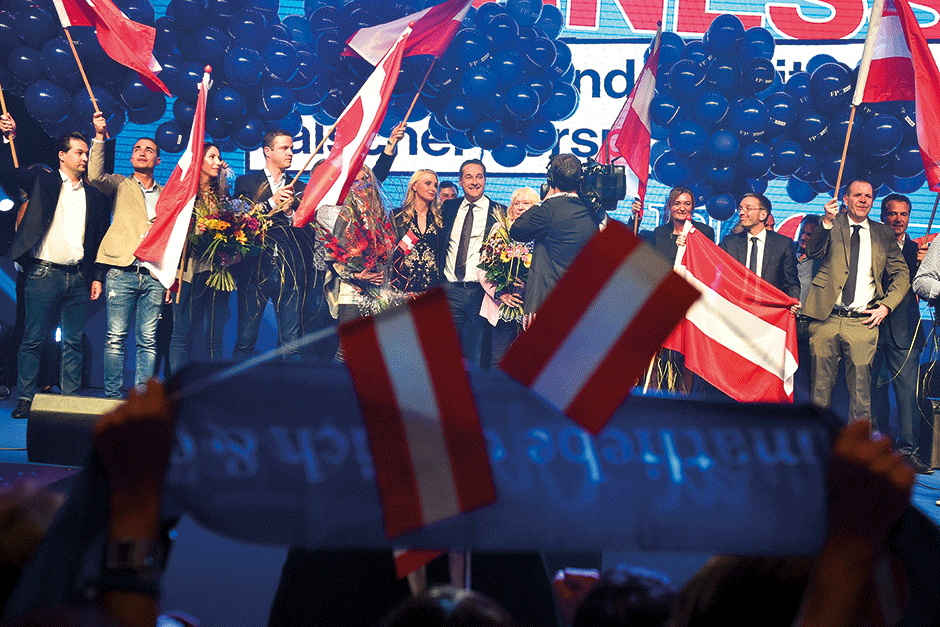
VIENNA: Austria’s far-right looked set Monday to return to power in a coalition with conservative “whizz-kid” Sebastian Kurz, the world’s youngest leader-in-waiting, in a fresh triumph for European populists.
The expected rightward shift in the wealthy European Union member state will pose a fresh headache for Brussels as it struggles with Brexit and the rise of nationalists in Germany, Hungary, Poland and elsewhere.
The People’s Party (OeVP) — rebooted by Kurz as a more hardline “movement” — was projected to sweep up 31.7 per cent of Sunday’s vote, with final results expected later this week.
In second place were the Social Democrats (SPOe) of incumbent Chancellor Christian Kern on 26.9 per cent, closely followed by the Euro-sceptic Freedom Party (FPOe) on 26.0 per cent.
Founded by ex-Nazis in the 1950s, the FPOe’s result is close to its all-time record of 26.8 per cent in 1999 under then-leader Joerg Haider, and twice that of their allies, the Alternative for Germany (AfD), last month.
Kurz, 31, forced the snap vote after becoming OeVP chief in May and ending the acrimonious decade-long coalition with the SPOe.
He attracted supporters in droves by depicting himself as a breath of fresh air, talking tough on immigration and vowing to slash taxes and red tape.
“With Kurz we have a new start for the country,” said Werner Schwab, 64, a gardener. “Although he is 31, he is an experienced, calm and disciplined person.”
Far-right ‘normalisation’
Given his open dislike for Kern and adoption of far-right themes, Kurz’s most likely coalition partner is the populist FPOe of Heinz-Christian Strache, 48.
Media reports said the two parties were already engaged in intensive behind-the-scene negotiations.
The least likely possibility is a tie-up between the FPOe and the SPOe, whose campaign suffered a string of mishaps.
Kern warned Monday Austria had witnessed a “massive rightward shift”.
“We are open to talks ... but there are enormous overlaps in the programmes of the OeVP and the FPOe,” Kern told public radio Oe 1.
“We will not betray our programme and our fundamental values.”
The OeVP and FPOe already shared power between 2000 and 2007, which turned Austria into a pariah.
But there would not be the same backlash now owing to what experts say is the “normalisation” of Europe’s far-right.
More EU tensions
In December, the FPOe almost won the presidency and topped opinion polls in the midst of Europe’s migrant crisis.
Like AfD, French National Front chief Marine Le Pen and Geert Wilders in the Netherlands — who both congratulated Strache on Twitter on Sunday — the FPOe has stoked concerns about a record influx of migrants into Europe.
But then Kurz came along and with his radical OeVP makeover stole some of Strache’s thunder.
As foreign minister, the rosy-cheeked Kurz claims credit for closing the Balkan migrant trail in 2016 that saw hundreds of thousands of refugees trek into western Europe.
“I promise I will fight for great change in this country. It’s time to establish a new political style,” Kurz said Sunday.
Despite Kurz’s pro-EU pledge, observers say a right-wing alliance risks driving a wedge between Austria and Brussels.
Vienna will hold the EU’s presidency in the second half of 2018, just when Brussels wants to conclude Brexit talks.
Kurz has openly praised Hungary’s populist premier Viktor Orban, while the FPOe is ambivalent at best about the EU.
Strache wants EU sanctions on Moscow lifted and pushed for closer ties with the Visegrad Four countries — Hungary, Poland, Slovakia and the Czech Republic.
A right-wing coalition “is likely to lead to more tensions with other EU members and Austria is likely to move closer to the Visegrad 4 states”, said expert Pepijn Bergsen at the Economist Intelligence Unit.












